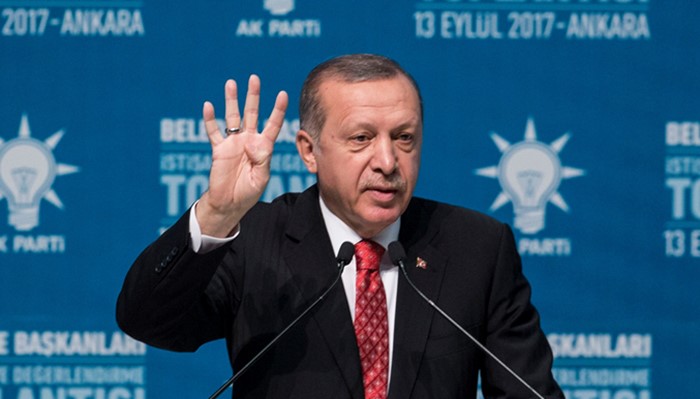According to prominent Turkish pollster Metropoll, the ruling Justice and Development Party (AKP) has seen its lowest polling numbers since its establishment. The AKP, which had garnered 42 percent of the vote in the latest election in 2018, has been in freefall since the beginning of 2020, which sensational moves on the part of President Recep Tayyip Erdoğan did little to stop. While the constantly worsening economy amid the COVID-19 pandemic sped up the AKP’s meltdown, Erdoğan, its chairman, is personally contacting much smaller parties for possible election alliances.
On April 21 Erdoğan hosted Oğuzhan Asiltürk, an executive of the Felicity Party (SP), at his palace for a fast-breaking dinner (iftar). During the event, the two walked down a turquoise carpet that is often rolled out for visiting heads of state. This was Erdoğan’s second meeting with Asiltürk in the past few months.
Asiltürk is a prominent figure in the SP and head of the High Advisory Board. The party represents Milli Görüş, a long-standing political Islamist movement where Erdoğan himself had begun his political career and grown his popularity. The SP is polling at around 1.3 percent. Its chairman, Temel Karamollaoğlu, despite being the chief executive, is overshadowed by Asiltürk’s influence on the party. That is why Erdoğan has been bypassing him to talk to Asiltürk directly.
The two first met in January when Erdoğan visited Asiltürk at home. It was during this meeting that Asiltürk conveyed to Erdoğan a request for Turkey’s withdrawal from the İstanbul Convention, an international treaty on combating domestic violence which for years had been in the crosshairs of Islamists for supposedly undermining family values. After the meeting, Asiltürk announced he had hope that their request would be fulfilled. On March 20 Erdoğan issued a presidential decree withdrawing the country from the convention.
Some have also noticed that a blanket ban on the sale of alcohol imposed as part of a full lockdown came right after Erdoğan’s second meeting with Asiltürk. According to the Cumhuriyet newspaper, the move was aimed at scoring points among Milli Görüş sympathizers. While the ban was ultimately revoked following a widespread public outcry, it continues to be implemented in some provinces through decisions introduced by local authorities.
In the last two elections, the SP had acted in sync with the Nation Alliance, a coalition of opposition parties from various parts of the political spectrum established to challenge Erdoğan’s rule. The SP was the third party making up the alliance along with the main opposition Republican People’s Party (CHP) and the Good (İYİ) Party, which had also received external support from the Peoples’ Democratic Party (HDP), which enjoys significant support among the Kurdish minority.
Against Erdoğan’s attempts to drive a wedge between the SP and the Nation Alliance, the opposition seeks to reinforce their collaboration and is talking to Karamollaoğlu, the official leader, instead of Asiltürk, the spiritual. İYİ leader Meral Akşener met with Karamollaoğlu a week after Erdoğan’s talks with Asiltürk. The two agreed on expanding the unified opposition to counter Erdoğan’s initiatives to dismantle it.
In the coming days a series of talks will be held to draw new parties into the Nation Alliance, particularly the DEVA Party and the Future Party (GP), two center-right parties founded by former AKP heavyweights who parted ways with Erdoğan. According to the polls, their combined support is around 4 percent.
For a while, DEVA leader Ali Babacan has been calling for a plan for Turkey’s return to a parliamentary system of governance instead of the presidential one currently in place, to be developed through a joint workshop encompassing the entire opposition. The CHP and İYİ have already responded positively.
Despite Erdoğan’s best efforts, the opposition continues to make moves aimed at strengthening their alliance. Erdoğan’s trump card, however, is the division within the SP leadership. While the relatively small party only polls at an insignificant 1.3 percent, Erdoğan hopes his success in snatching it away from the opposition bloc will be followed by other demoralizing blows to the alliance.
Another worrying trend for Erdoğan is the numbers seen in presidential election polls. According to one poll conducted by the Eurasia Public Research Center (AKAM), only 29.7 percent said they would definitely vote for Erdoğan in a re-election run, while 48.5 percent said they would definitely not. The results also show that the popular opposition mayors of İstanbul and Ankara, Ekrem İmamoğlu and Mansur Yavaş, respectively, are both polling ahead of Erdoğan in a potential presidential race against him.

